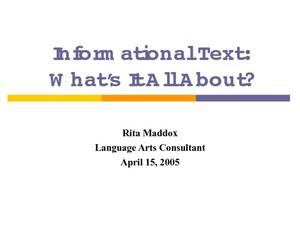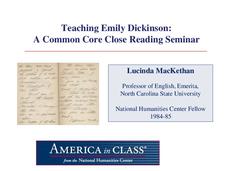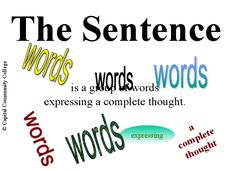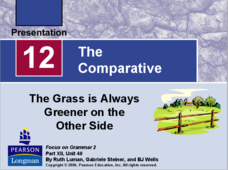Curated OER
Biomes
Arranged as an interactive lesson, this presentation focuses on the six world biomes. Upcoming biologists click on a specific biome and a slide lists its location, description, native plants, and animals. A quiz provides learners with...
Curated OER
Life in the Colonies
What was life like for the early colonists? Read along with an informational presentation, rich in text. Colonial slavery, slave culuture, colonial religion, and the Great Awakening are all described in full. Tip: The resource could be...
Curated OER
Parody
Expand your students' literary likings with this quick PowerPoint about parodies. A detailed definition of a parody on the second slide precedes different examples of parodies in pop culture. Tip: Show videos of famous parodies your...
Curated OER
South Africa's Apartheid
Discuss South African apartheid, the anti-apartheid movement, and the literature and music it inspired. Slides contain images and facts about life in South Africa during apartheid, social uprisings such as Soweto, and the various...
Curated OER
Informational Text: What's It All About?
With the Common Core State Standards' growing focus on informational text, it's the perfect time to showcase this PowerPoint to your team of teachers. It's 59 slides focus on seven best practice structures: reading-as-thinking,...
Pearson
The Simple Present: Affirmative and Negative Statements
The present tense is a helpful skill to review in any language arts classroom. Focusing on statements made in the affirmative and in the negative, a slideshow presentation guides pupils through grammar rules and examples for the simple...
Pearson
Subject and Object Pronouns; Direct and Indirect Object
Replacing a gift can end up in an awkward moment—but not when replacing a noun with a pronoun! Watch the most effective ways to use subject and object pronouns, as well as direct and indirect object pronouns, with an entertaining...
Pearson
Non-Action Verbs
A verb is something you do — but can you always see the action? Use a slideshow presentation to clarify the differences between verbs that describe actions, and verbs that describe senses, preferences, and emotions.
Dickinson College
Test Your Best Jeopardy
Make test-taking fun with a Jeopardy game that reviews the skills and stretegies needed to have a successful experience. Categories include test readiness, brain blockers, test strategies, tests pitfalls, and anxiety reducers. Learners...
National Humanities Center
Teaching Emily Dickinson: A Common Core Close Reading Seminar
Three of Emily Dickinson's poems, "I like to see it," "Because I could not stop for Death," and "We grow accustomed to the Dark," provide instructors with an opportunity to model for class members how to use close reading strategies to...
Curated OER
Endocrine System: Hormones
Almost a duplicate of another slideshow on our site, these slides covering classes of hormones and their function, have gaps prepared for your pupils to fill in. This copy could be printed out for your class to complete as notes during...
Curated OER
Kingdom Animalia: Sponges, Cnidarians, Flatworms, and Roundworms
As you work through the biological hierarchy, visit several phyla within the animal kingdom. This PowerPoint introduces viewers to characteristics and reproduction in sponges, cnidarian, flatworms, and roundworms. Make sure to add the...
Curated OER
Fractions (2)
Review or introduce your younger learners to simple fractions. They work through fifteen different problems, where the shaded amount must be identified as a fraction. For each problem an answer is included on the following slide. Tip:...
Curated OER
The Ashcan School of Artists
Complete with explanations and many examples of relevant paintings, this presentation takes students through the characteristics of the Ashcan School of Artists. The slides include works by artists such as Everett Shinn, John Sloan, and...
Curated OER
Subject and Predicate
The subject and the predicate are two vocabulary words that every young writer must know. This short, but effective, presentation aptly describes what the subject and predicate are, what role they play in a sentence, and offers some...
Curated OER
The Puritans
Puritans, their origins, their beliefs, and values are the subject of a presentation that could be used to introduce viewers to early American history or literature. The PowerPoint could also serve as a model for group projects and would...
Curated OER
Animal Nutrition
Use this great overview to give information on all aspects of nutrition. By working their way through this PowerPoint, students review a lot of information about the digestive process. Students read many facts on a number of...
Curated OER
Where Does the Comma Go?
Where does the comma go? Use this resource to help your class practice placing commas. They work through 10 different sentences adding the comma to the proper place in each. Tip: Award points to the group that correctly places the comma...
Curated OER
Sight Words
Practice sight words. There is a list of forty-six words, such as house, very, and half. Learners could use this resource to practice reading or spelling these words. It would also work well as part of a whole group or center activity.
Curated OER
Play Ball!
This PowerPoint provides an overview of how to construct and complete analogies. The slides give examples of how analogies work and have illustrations to match. This PowerPoint also provides students with a chance to fill-in the given...
Curated OER
Ionic, Covalent, and Metallic Bonding
You may want to make a few changes before sharing this slide show with your chemistry class. For one, remove the bright blue swirly background that makes the black font hard to read. Ionic bonds are described with the use of an electron...
Curated OER
Who Wants to Be a Spellionaire?
Have your class practice spelling a list of challenging words, such as explanation, detention, and more. While only a quick review of the topic, this format could be replicated for use with any spelling activity. This is a great way to...
Pearson
The Comparative
A lecture on comparative adjectives is good, but an engaging presentation is better! Take learners through the rules of comparing one thing to another with a slideshow about how some experiences can be better or worse than others.
BW Walch
Solving Systems of Linear Inequalities
One thing that puzzles a lot of young algebrists is the factors in a word problem that are taken as "understood". This presentation on solving systems of linear inequalities does a great job walking the learner through how to tease those...
Other popular searches
- Cooperative Group Work
- Small Group Work
- Modeling Group Work
- Group Work Maths
- Group Work Rubric
- Group Work Lesson Plans
- Group Work Language Arts
- Group Work Dna
- Group Work Poverty
- Grading Group Work
- Group Work Peer Evaluation
- Cooperative Group Work Math

























